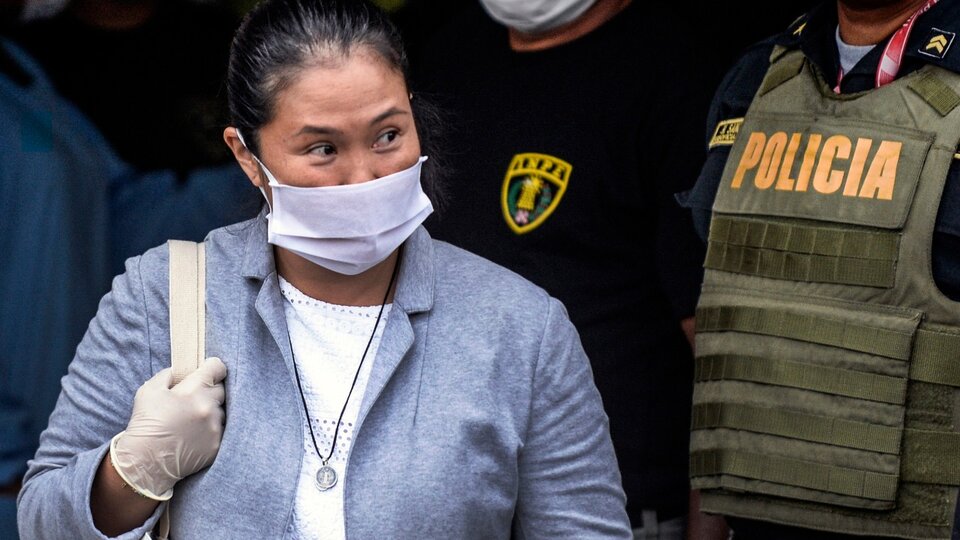
[ad_1]
From Lima. The presidential candidate Keiko Fujimori faces possible sentence of more than 30 years in prison. The prosecution closed the investigation opened more than two years ago on Thursday and filed a charge against Keiko for the crimes of money laundering, criminal organization, obstruction of justice and generic lying. The prosecution relates to the millionaire secret contributions made to Keiko’s presidential campaigns in 2011 and 2016. Prosecutor José Domingo Pérez, in charge of the case, requested 30 years and 10 months in prison for the daughter and political heiress of the former dictator Alberto Fujimori (1990-2000), in prison since 2007 sentenced to 25 years for crimes against humanity and corruption. There are forty other accused. Keiko, 45, is running for the presidency for the third time in the April 11 elections.
The daughter of the former dictator, who intends to bring Fujimori back to power, has been in pre-trial detention twice – due to obstruction of the process and danger of escape – in connection with the case. The first time for thirteen months, between October 2018 and November 2019, and the second for a shorter period, between January and May 2020. The prosecutor asked that he be prevented from leaving the country for three years, which is the time. prosecution believes that the legal process would last until a sentence is passed. The case is now brought before a judge responsible for reviewing the accusation and then before an oral court which will be responsible for trying the accused.
The charges against Keiko are based on hidden delivery that important companies – among which the Brazilian construction company Odebrecht, involved in a mega-corruption scandal – waged their presidential campaigns in 2011 and 2016 for more than ten million dollars. These millionaire sums were delivered in cash, in secret meetings, in some cases to Keiko herself, in others to emissaries sent by her. At first, Fujimori’s current leader denied the smuggling of money, but later, faced with the weight of evidence, she agreed to receive hidden funds for her election campaigns. His defense argued that it was “a fault” and not a crime.
The evidence against Keiko includes testimonies from powerful businessmen who confessed to these secret deliveries of millions of dollars to the presidential candidate. And also the confessions of those who were close associates of Keiko at the time, who reported to the prosecution how a mechanism was put in place and exploited to launder these underground millionaire contributions, through a long list of delicate donors. and fundraising events in the allegedly raised amounts were inflated.
Senior officials at Brazilian construction company Odebrecht told Peruvian authorities that they donated $ 1.2 million for Keiko’s presidential campaign in 2011. One million dollars was given in cash to two Keiko emissaries, the 200 The remaining $ 000 was channeled through the main company. union of Peru to add to a bag of support for candidate Fujimori, who in this year’s elections faced the second round Ollanta humala, who defeated her.
Peruvian businessmen have also confessed to hidden contributions to the Fujimori campaigns. Dionisio Romero, head of one of the most powerful economic groups in the country, revealed to the prosecution that he had secretly given Keiko $ 3.65 million for his presidential campaign in 2011 and an additional $ 450,000 for that of 2016. Romero , owner of the country’s largest bank, confessed that these campaign contributions were unfunded, that they were made during several secret meetings he had with Keiko, in which he handed over suitcases full of bills. Peruvian-Chilean businessman Juan Rassmuss gave Keiko, also in cash and in the shadow of secrecy, $ 3.4 million for the 2011 campaign and $ 1.4 million for the 2016 campaign. A third confession is from the owner of the powerful dairy group Gloria, Vito Rodriguez, who claimed to have given, also secretly and in cash, 200,000 dollars to the candidate Fujimori in 2011. Members of the so-called “construction cartel”, formed to distribute public works after paying bribes , also said they made secret contributions to Keiko’s campaigns.
Once the accusation was known, Keiko again played the victimization card. “I will continue to face this persecution,” he said. Although the tax investigation has been ongoing for more than two years, he accused the prosecution of trying to affect his election campaign with this accusation. The prosecutor José Domingo Pérez He denied political intentions, described Keiko’s statement as “a misdemeanor” and said the prosecution had “a strong case” to accuse candidate Fujimori.
A survey by the Institute of Peruvian Studies into the intention to vote in the April presidential elections puts Keiko in third place with 8.1%, tied with the former footballer. George Forsyth, behind Yonhy lescano, of the center-right Popular Action Party, first with 11.3 percent, and of Veronika mendoza, from the left Juntos por el Perú, with 8.9 percent. Datum poll places Keiko tied for second with Forsyth and far-right Rafael López Aliaga, with 7%, in first place is Lescano with 13%.
.
[ad_2]
Source link
 Naaju Breaking News, Live Updates, Latest Headlines, Viral News, Top Stories, Trending Topics, Videos
Naaju Breaking News, Live Updates, Latest Headlines, Viral News, Top Stories, Trending Topics, Videos